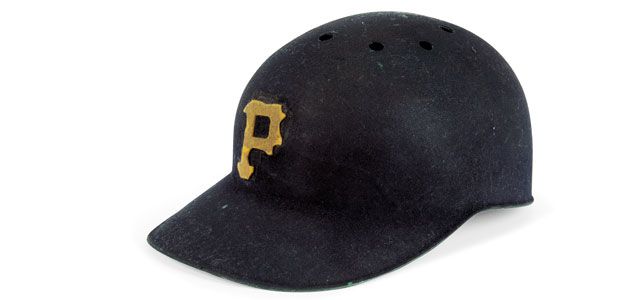Roberto Clemente was born and raised in the small town of Carolina, Puerto Rico in the early 1930’s. He was the youngest of seven children.1 From a young age he excelled at baseball and at the track event Javelin. At age eighteen, he tried out for the Brooklyn Dodgers. Roberto made the team with ease in 1952, but this is where his trials began. The Dodgers had five African-American players on the team already, including the famous Jackie Robinson. The owners saw no need for another “colored” player on the team.2

After his contract with the Dodgers’ minor league team in Montreal expired, the young Pittsburgh Pirates organization picked up Clemente in order to rebuild their team. But the Pirates didn’t give him a lot of playing time either, so he decided to return to Puerto Rico.3 But in 1956, after dominating back in his home town, Roberto finally caught his break with the Pirates. He returned to the United States, and he began to rise in fame rapidly, gaining success in the League. In his first season he finished with a batting average of .255. This success didn’t smash the curveball that was thrown his way because of his race. On several occasions, his teammates called him a “nigger.” It was also common for Clemente to stay in separate hotels from the white players on the team, due to segregation laws. Young Clemente was not even treated as an equal in the sport that he had been working so hard for years to adapt to.4 Whether it was the law, or people’s racial prejudices, Clemente continued to remain the outsider.
The Pirates eventually won the World Series in 1960, and Roberto Clemente finished that season with the stellar batting average of .310. As Clemente began to rise in fame, and people began to realize his potential for greatness, he began to receive death threats in the mail. One of the letters read “Did you ever get shot before?”5 In fear for his family’s safety, Clemente moved them home to Puerto Rico in order to protect them from such bigoted Americans of the 1960’s. After moving his family back to Puerto Rico, Clemente told the media, “I don’t want to be put down because I’m Puerto Rican. I don’t stand for disliking someone because of their color. If this is the case, I don’t want to be living. I am a double nigger….. for my skin and my heritage.”6
After Clemente moved his family back to Puerto Rico, and bounced back from the serial experience of death threats, and he became the League’s MVP in 1966.7 Clemente refused to let others keep him down because of the color of his skin. Clemente was not only an inspiration to people on the field, but was so off the field as well. In his spare time he would visit Puerto Rico in order to spend time with his family. But he also gave back to the struggling community he grew up in by helping out in the local clinic in Carolina. He also opened youth baseball programs for kids in Puerto Rico.8 Roberto helped raise over $150,000 for his home town. Clemente’s love for others, and actions in order to help his people and the community, was recognized by people all over the United States. He was becoming one of the most well-known athletes not only for his incredible playing abilities, but for his devotion to his personal humanitarian aspirations.
Then suddenly, on New Years Eve in 1972, while flying to Nicaragua to drop supplies off after a tragic earthquake, Roberto Clemente’s plane crashed. There were no survivors and Roberto Clemente’s body was never found. The plane was allegedly 1,900 kilograms over the weight it could carry.9

Roberto Clemente finished his career with over 3,000 hits, 4 World Series titles, 12 Golden Gloves, a two-time League MVP, and was inducted into the Hall of Fame in 1973.10 Roberto Clemente is remembered in Major League Baseball for so much more than these incredible stats. To this day, the MLB gives the Humanitarian Award to baseball players who best exemplify service to their team, community, and families.11 Clemente will forever be recognized for his love for others. And he fought for a sport he loved. There is much diversity in the MLB today, whether it is Yu Darvish from Japan, Didi Gregorius from the Netherlands, Arolodis Chapman from Cuba, or Carlos Correa from Puerto Rico. Clemente is a major reason for this diversity. He received death threats and experienced discrimination because of his color. But, most importantly, after all these trials, Clemente still managed to give back to his community and love others, which is why he’s an inspiration to Latinos and to people everywhere.
- Alan West, Roberto Clemente: Baseball Legend (Brookfield, Conn: Lerner Publishing Group, 1993), 6. ↵
- Salem Press Biographical Encyclopedia, January 2017, s.v. “Roberto Clemente,” by Lynn C. Kronzek. ↵
- Alan West, Roberto Clemente: Baseball Legend (Brookfield, Conn: Lerner Publishing Group, 1993), 10-12. ↵
- Alan West, Roberto Clemente: Baseball Legend (Brookfield, Conn: Lerner Publishing Group, 1993), 10-12. ↵
- Roberto Clemente. n.p.: (Washington, D.C.): Federal Bureau of Investigation, 2003. ↵
- Alan West, Roberto Clemente: Baseball Legend, (Brookfield, Conn: Lerner Publishing Group, 1993), 13. ↵
- Salem Press Biographical Encyclopedia, January 2017, s.v. “Roberto Clemente,” by Lynn C. Kronzek. ↵
- Alan West, Roberto Clemente: Baseball Legend (Brookfield, Conn: Lerner Publishing Group, 1993) 19-25. ↵
- Madeleine White, “Baseball’s Roberto Clemente dies in a plane crash,” Globe & Mail , 2015, A2. ↵
- Salem Press Biographical Encyclopedia, January 2017, s.v. “Roberto Clemente,” by Lynn C. Kronzek. ↵
- Wes Lukowsky, “Clemente: The True Legacy of an Undying Hero,” Booklist 110, no. 1 (2013): 30. ↵


53 comments
Jackie Velasquez
I enjoyed reading this article and learning about Robert’s life outside of baseball. However I never knew how he passed, and that they never recovered his body. This is sad not only for me, but for his family as they don’t receive their sons body. It makes me proud to hear that he has changed the way the game is played now. Not only from color, but from him continuing to fight for what he loved.
George Assaf
This was a great article to read. I find it to be inspirational how he helped his country and at the same time gave so much to the sport he loved. Even though he had to go through many setbacks to get to the MLB and have such a career he achieved it. He is a great role model and a great example of what it means to never forget where you came from. I loved reading this article, great job!
Tyler Pauly
It’s extremely sad and unfortunate that Clemente’s life was cut short. He was such a great person and did great work for his community in Puerto Rico. He was an extremely selfless person and, to me, that is even more impressive given the adversity and hardships he faced during his life time. One of my favorite facts about Clemente is that he was actually taken in the Rule 5 Draft, and is the only one of 3 players ever to ever make the HOF from the draft. It is really cool, albeit well overdue, that MLB is recognizing Roberto Clemente Day and letting players all wear the number 21. Clemente definitely deserves this honor and, in my opinion, should join Jackie Robinson as the second player to have his number retired league wide.
Maria Ferrer
This article is truly an inspiration for many Hispanic Men, especially athletes. It takes people like Roberto Clemente to show the world that their dreams can be more than just dreams. There are always obstacles along the way and people are always going to be trying to bring you down, and for Clemente it was because of his skin color and background. It’s incredible the many things he accomplished in life, for instance he has 4 world series titles, he was inducted into the hall of fame and 12 Golden globes. It’s a shame his story had to end so soon and it’s such an inspiring story because he was able to do all these things and he never gave up, despite his background.
Joshua Buske
Roberto Clemente was the first Hispanic player to be named a major league team MVP, first Hispanic to be named World Series MVP, and first to win a World Series (as a starter). Roberto Clemente finished his career with 3000 hits in 1972. Roberto Clemente was involved in humanitarian efforts. Clemente is a role model for all athletes with what he’s done on and off the field.
Tyler Caron
It is sad that Roberto Clemente died in a plane crash. He was going to help others in need and it cost him his life. Roberto was also an amazing baseball player. He played for the Pirates organization and helped them win a lot games. It is sad that he had to live through so much racism. He was a very important player in the civil rights movement. He will be a baseball legend forever.
Sebastian Portilla
Roberto Clemente was great at two things, baseball and thinking of others. Clemente had a .307 BA, 240 HR and 1305 RBI. He was a competitor that always loved to win and be the best. I love this article because not many people know about Clemente. He died in a plane crash on his way to help people in need. He was a hero in pittsburgh and everyone who loved the game of baseball. Thats what sports is all about. Its all about giving back to the community .
Engelbert Madrid
I’m not a baseball fan, but stories of athletes that never gave up to become one of the greatest athletes in history inspires me to persevere. Although it was difficult for Roberto Clemente to adapt to the racism in the United States, he always had his goal in mind to do whatever it takes to get where he wanted to accomplish. Fortunately, Clemente will be forever remembered, especially during the Civil Rights Movement.
Alicia Guzman
This article is interesting because usually when you think who is the person of color that paved the way for others in baseball becoming a legend you would without hesitation think Jackie Robinson and who would not be wrong. What is interesting that is that this article highlights the struggle and legendary Latino baseball player, Roberto Clemente. How his story starts provides true inspiration but how his story ends in tragic and devasting. Wonderful article.
Victoria Rodriguez
I have not heard of Roberto till this article. Which I think is surprising because I have heard of Jackie Robinson and I do not think Roberto has received the same attention despite being around the same time period. However he sounds like he was very successful considering the obstacles he faced. Just the way he sideshows what kind of person he really was. This was a great article and I think that this was necessary to write since I do not think many people have heard of his life story.